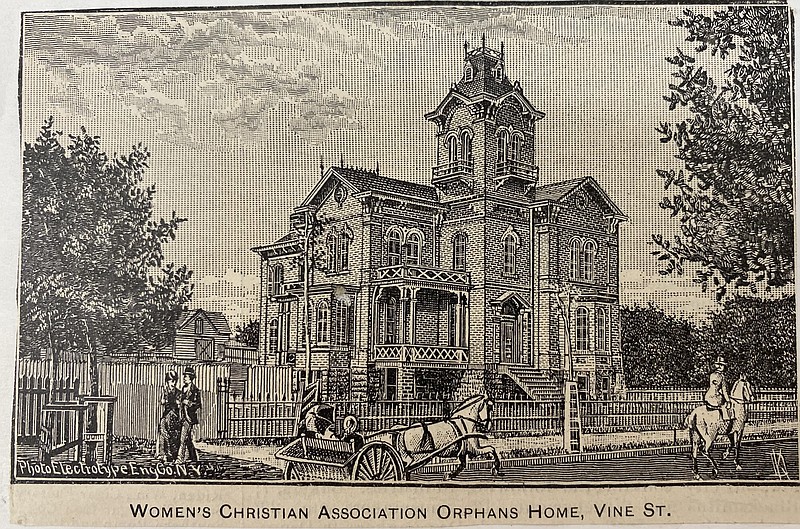On March 3, 1878, the Chattanooga Weekly Commercial headlined a story, "Save Her," detailing the life of a "very pretty girl of eleven years - an orphan, whose mother died near Ooltewah, Tennessee, and left her and a sister, a girl of fifteen years, in the cold world alone, the father having died several years ago."
The story portrayed the sisters' circumstances, living in a house with "loose" women, where the older sister has been compelled to "leading her life of shame" to provide for the two of them. The printed plea urged a "charitably disposed couple, who has not been blessed with the greatest of all blessings - children" to give this girl "a respectable home."
Members of the Women's Christian Association "took the matter in hand." After first attempting to use persuasion to "rescue" both girls and then threatening to involve the Chattanooga Police, the women were successful in removing "Emma and Lucinda" from the disreputable circumstances. Homes were located, and the Women's Christian Association had found its mission: providing care for the region's orphans.
Only one year later, on April 7, 1879, the Women's Christian Association announced a series of public meetings "to be held at the different churches, that our plans might be fully laid before the public and prove the necessity for a permanent Home in which to carry on our work successfully."
What were the plans? The Women's Christian Association had rented a house on Oak Street, between Houston and Douglas streets, and had already begun caring for eight children, with an additional eight girls already placed in homes and a number of young boys awaiting homes and job training. Mrs. S.D. McCorkle, association secretary, spoke about the individual young people needing assistance. In her compassionate appeal for assistance, she noted that several were orphaned while others belonged to "sick and destitute mothers" who could not care for them as they were residing in the "Alms House."
After an explanation of the association's plans, Mrs. McCorkle ended her remarks by asserting that they were doing God's work, and "He will never leave or forsake those that put their trust in Him." She then asked their special guests to come forward and speak about the plans for a children's orphanage and home.
Judge R.M. Barton, Charles D. McGuffey, T. Richmond and the Rev. Thomas Hooke McCallie spoke in turn about the children's plight, the thoroughness of the association's plan and the need for the community to fund the plan. McCallie said that "everyone had come to the meeting with the intention of giving something and that he had an agreement already prepared for those who desired to do so to sign."
Noting that the women need $4,000 to move forward with their plans, McCallie called those in attendance to sign the pledge. More than 40 attendees stepped forward. Among those promising their financial support were J. Wilkinson, John G. Rawlings, T.J. Gustavson, W.C. Payne, Adolph S. Ochs, W.C. Payne, Dwight Montague, Mrs. G.A.R. Tucker, J. Long and J.P. McMilian. A hat also was passed among the crowd, "liberal contributions" were received, and the Women's Christian Association's plans began to move forward. Chattanooga had made a commitment to caring for the children.
On the 10th anniversary of the "orphan's home," one local newspaper writer recalled the beginning, when "a few benevolent Christian ladies, whose hearts were moved to pity at the condition of little children and babies left alone or worse, determined to better the conditions of the orphans. Had they not been plucky as well as sympathetic their zeal would have been short-lived." He traced the "good works" evolution from a small home to a two-story house on Vine Street and reminded readers of the continuing work done by "Mesdames T.H. McCallie, G.A. Wook, J.F. Loomis, A.A. Aull and Miss Hattie Ackerman."
There were now 28 children, from six months to 16 years, living in the home under the supervision of Mrs. C.A. Reed. Hamilton County provided $4.60 per month per child; all additional funds were gifted by individuals and local churches at the bequest of the Christian Women's Association.
The anniversary article ended with a plea. "Should not Chattanoogans contribute to the Vine Street Orphans Home?" Chattanooga's philanthropic community answered that question with a resounding "yes," and the children had found their champions.
Linda Moss Mines, the Chattanooga-Hamilton County historian, also serves as historian of Chief John Ross Chapter, TSDAR. Visit chattahistoricalassoc.org for more information.
